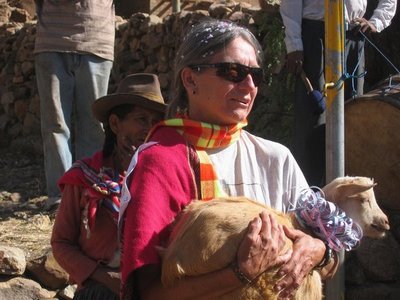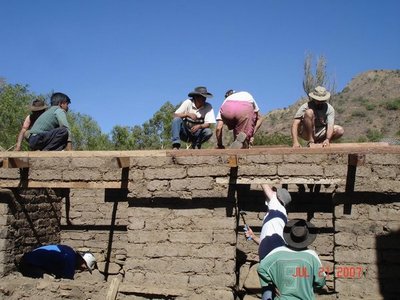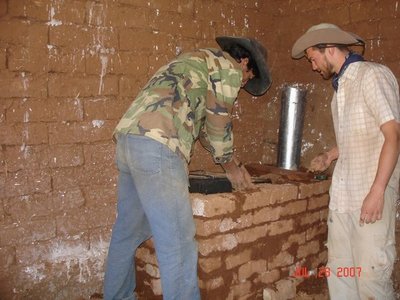March 13, 2008
Engineers Without Borders hosts conference
This month, the UW will host more than 600 members of Engineers Without Borders-USA. The UW chapter that began as an intimate group of dedicated students and faculty is now a thriving organization conducting tech-focused humanitarian projects. The local surge of interest reflects a broader trend: Engineers Without Borders-USA, founded in 2000, is one of the fastest-growing professional organizations in the country.
“The group has really exploded. It’s an idea whose time was ready,” says Mark Benjamin, UW professor of civil & environmental engineering and founding faculty adviser for the UW chapter.
Engineers Without Borders (http://www.ewb-usa.org/), modeled on the group Doctors Without Borders, is a group of students and professionals who travel the world and use their technical expertise to build safer, healthier communities.
The upcoming conference, March 27–30 on the UW-Seattle campus, is co-hosted by the UW, Seattle University and the local professional chapter. This is only the fourth EWB-USA international meeting, and it’s the first time it will take place on the West Coast.
“The University of Washington is thrilled to host this conference,” said Matt O’Donnell, dean of the UW’s College of Engineering. “Engineers Without Borders projects train future engineers to be culturally savvy and adept at implementing appropriate technologies. This conference promises to be a premier forum for advancing sustainable engineering, and we’re proud to be a part of it.”
The UW chapter of Engineers Without Borders began in 2005. Faculty adviser Susan Bolton teaches an upper-level class on managing overseas projects. The chapter has about 50 active members who hold weekly meetings, conduct fundraising campaigns and undertake local and overseas work.
Members recently got back from a trip to Yanayo, Bolivia, a community of about 100 people located in the Andean Mountains (see accompanying article). That project grew out of a suggestion from an engineer at a Bolivian university. Like all EWB projects, this one began with a need identified locally.
The UW chapter will return to Bolivia to work on roads and expand their work to neighboring villages. UW members are also beginning a project to supply clean drinking water to a village in Suriname located downstream of gold mining operations. A local project is also in the works at San Juan National Park.
The Puget Sound professional chapter is also relatively new and growing. It formed in 2003 and now has about 200 affiliates and 45 active members, said chapter president David Cook, principal geologist at local firm GeoEngineers. Recent activities include replacing schools destroyed by the Sri Lankan tsunami and designing water supplies for a drought-prone region of Ethiopia. One member is evaluating a biodiesel project that would power Jamaican fire trucks.
For the professional chapter, it’s not only a way for members to travel and apply their skills. It’s also a way to energize the profession.
“EWB offers a platform for young engineers to apply their engineering skills […] in philanthropic ways. This generational shift in concerns is very apparent, and important as we struggle to encourage more young people to consider engineering as a career,” said Kurt Fraese, CEO of GeoEngineers.
It’s true. When Donee Alexander was choosing a Ph.D. program, she looked for a school that had a strong civil engineering program and a student chapter of EWB. She found both at the UW, and has become an active member of the committee.
Some 100 chapters will be represented at the upcoming meeting, and Alexander will be among the members presenting their work to the group. William H. Gates, Sr., a UW Regent and co-chair of the Bill & Melinda Gates Foundation, will deliver the conference’s keynote speech on this year’s theme of sustainable engineering and global health. An award ceremony will be hosted by UW engineering alum Bonnie Dunbar, president of the Museum of Flight.
Dozens of other invited speakers include Bernard Amadei, founder of EWB-USA; William Wallace, author of Becoming Part of the Solution: The Engineer’s Guide to Sustainable Development; and Heather Fleming of the Appropriate Technology Design Team whose cooking stove for refugees in Darfur has been featured in O Magazine and Newsweek.
More information about the conference is here. Spaces are available for Friday’s events only. Anybody not attending the conference who would like to learn more about EWB is encouraged to attend a chapter meeting.
For more information, go to http://students.washington.edu/ewbuw/.
Goat is unlikely gift for EWB adviser Bolton
By Sandra Hines
News and Information
Suddenly Susan Bolton found a young goat placed in her arms.
It was nearing the end of a lengthy farewell ceremony in the Bolivian village of Yanayo — almost to the point of everyone getting into vehicles for the six-hour drive to the airport. The villagers had already presented the Engineers Without Borders work party with other thank-you gifts.
Now, here was this goat.
“A goat is a very big deal, a very big gift — but what was I supposed to do with it?” says Bolton, a UW professor of forest resources. UW doctoral student Donee Alexander had the presence of mind to say that it would be illegal to take a goat into the United States. Bolton was able to politely decline keeping the goat.
The gifts came at the end of a monthlong project in 2007 involving the UW student chapter of Engineers Without Borders. That visit they helped put in place an irrigation system to water crops and installed new cooking stoves for the village of 23 households, about 100 people.
When Bolton and one of the students returned to the village last month to assess the progress, they were excited to see that the farmers were going to be able to get at least one, and possibly two, additional crops a year because of the irrigation system.
And nearly all the women were using the new stoves. The few that hadn’t will receive additional help to learn the differences between fire building in the new stoves and the open-pits that had previously been used.
That kind of follow-up is part of the Engineers Without Borders’ commitment of two to five years of support for each community they decide they can help. That work might involve water supply and sanitation, food production and processing, housing and construction as well as energy, transportation and communication systems.
Getting the community stoves was an obvious project: the Yanayo women, many of whom would have their children with them while they cook, were exposed to heavy smoke in the small cooking huts with thatch roofs and open fire pits.
“We hung air quality monitors up in the thatch of a few of the huts and anything you touched just scattered soot and debris everywhere. It was awful,” Bolton says.
The World Resources Institute, a Washington, D.C., environmental think tank, says that the indoor pollution from cooking fires kills an estimated 1.6 million people a year worldwide, mostly women and children.
The UW group returned home from its first trip and designed ventilated wood stoves for the village. Two prototype stoves were built in Seattle. The final design incorporated Yanayo women’s traditional cooking preferences and was made from adobe.
The community decided they would build new mud cooking huts, something they did in 2006 and 2007 before the work party of engineers returned with stoves and stove pipes. Once back in the village, the engineering group roofed the new cooking huts and installed the stoves. They made last-minute modifications based on people’s preferences and what materials were available. They conducted two workshops on how to operate the new stoves.
That on top of installing an irrigation system for the community was an incredible amount of work, Bolton says.
UW students back in 2005 provided the driving force for an active student chapter of Engineers Without Borders, Bolton says. Doctoral students Stephen Hawley and Austin Polebitski, both in civil engineering, were key players and the first president of the student chapter was Jonathan Miller.
There is a plan for the group to do stoves and roofs for two villages adjacent to Yanayo, possibly in July. The group also wants to stabilize a road that got washed out during the rainy season, work tentatively scheduled for September.
Bolton is a hydrologist and stream ecologist with the College of Forest Resources and has adjunct appointments in civil and environmental engineering and aquatic and fishery sciences. None of which necessarily prepared her for all the logistics challenges of the Bolivian project.
Take for instance having to shop for food for 470 meals that the Engineers Without Borders work party needed for a month of work last summer. Bolton and graduate student Robyn Wilmouth stocked up in the city of Cochabamba, 60 miles from Yanayo.
“It became quite a show for everyone in the market, these two American women buying what looked like a year’s worth of food all at once.”
Perhaps next she’ll be applying her logistic expertise to another South American country because the group is in the process of starting a project for potable water in Suriname.



